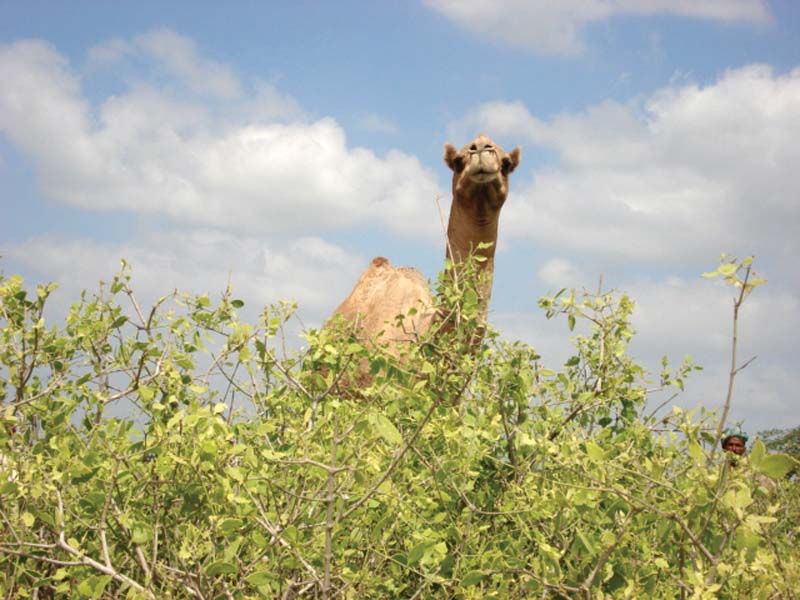
The cutting of this special shrub is not a new issue - several social organisations have raised their voices against it. Dozens of shops openly purchase its roots and send it to Karachi, free of any repercussions.
Three tribes in particular, the Jats, Maheris and Ribaris, solely depend on rearing camels and believe the cutting of this tree has directly affected camel breeding in the area. The tribesmen claim that alongside the salvadora persica their animals are also disappearing.
Rosewood trees dying a slow, mysterious death
In 2007, the Badin district administration imposed a ban on the cutting of Salvadora Persica for the first time, with the Dadu and Tharparkar district administrations following suit - no one was allowed to cut a single tree in three districts. According to locals, FIRs were also registered against cutters and purchasers of the Salvadora Persica.
Senior forest officer Javed Ahmed Mehar said that the Salvadora Persica is a blessing in the coastal belt. "It reduces water-logging," he said, adding that the tree is a slow-growing species. "It also acts a wall against sea erosion," he explained.
Mehar said that in areas like Badin, Thatta and Tharparkar the fruit of the Salvadora Persica is a subsidiary diet for birds, especially peacocks. "Its fruit is also nutritious for poor people," he added
"It's cutting was completely banned," said Muhammad Khan Samoon, head of the Badin Development and Research Organisation. "We launched a movement against its illegal trade," he added.
Going green: Knock Knock. Want a free plant?
Samoon said that there were a number of reasons why people cut this tree, which is the main source of camel feed. "There is unemployment," he said, adding that due to lack of the interest of local residents and weakness of the law, traders have exploited the situation. "It actually directly affects our culture and the source of earning of thousands of people," he explained.
Mushtaque Maheri, a resident of Golarchi, scoffed at the notion of stopping cutters and purchasers of the tree. He said that cutting of trees is not a major issue but these cutters drag the whole tree along with them. "It is a natural tree in this coastal belt and once anyone cuts it from its root it doesn't grow again," he lamented.
Maheri said that a camel can eat 32 different species of trees. "But it likes this species most and it's the major source of feed in the coastal belt," he claimed. Maheri said the shrub-like tree once grew in abundance in the area but now up to 75 per cent of it has disappeared.
According to Samoon, there are hundreds of shops in the Thatta and Badin districts where salvadora persica roots are sold and sent to Karachi. He said that these roots are used to clean teeth as miswak. "It is also sent outside Pakistan," he added.
PHA to plant 1,000 trees along signal-free corridor

"People also used its wood for making their houses and our children were fond of eating its fruit," recalled resident Fateh Ribari.
Ribari, like others, believes that the social and economic downturn has compelled the people of the coastal belt to cut the tree in massive quantities. He said that the salvadora persica was once seen everywhere in the rural areas. "It was even seen in forests and graveyards."
"We can't take action against cutters and purchasers," lamented Jan Muhammad Soomro, district Badin's forest officer. "It's not legally banned."
He said that the district administration imposed a ban on its cutting twice, once in 2007 and again in 2010. Soomro added, however, that the ban was imposed for a certain period of time. "It doesn't exist now," he explained, adding that his department can only take action according to the law.
Published in The Express Tribune, December 28th, 2015.

















COMMENTS
Comments are moderated and generally will be posted if they are on-topic and not abusive.
For more information, please see our Comments FAQ